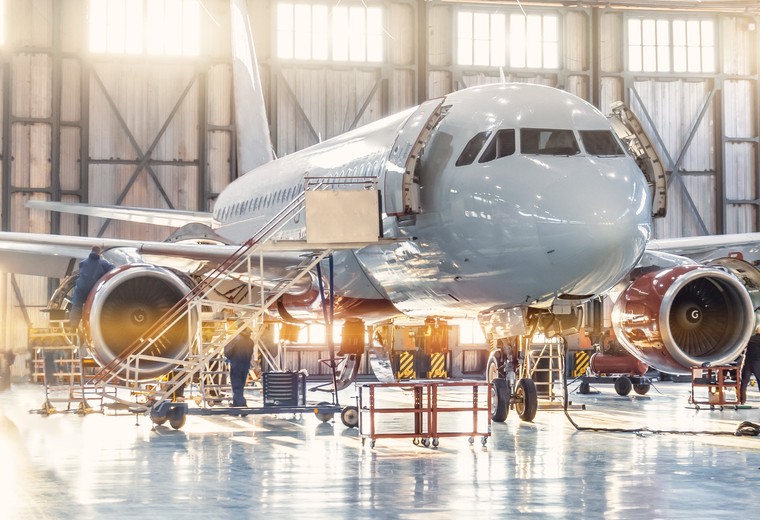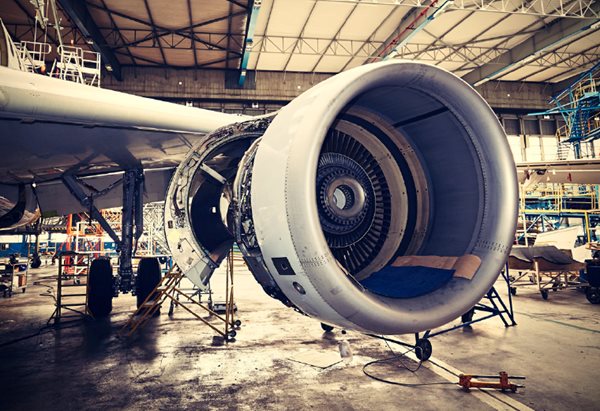AS9100 Standard
The aerospace industry has unique requirements for quality management, which is why many companies that deliver products and services within the aviation, space and defense spheres work to earn AS9100 certification. This standard sets quality management system requirements with the challenges of the aerospace industry in mind.
At NQA, we perform certification audits for AS9100 and related standards. Learn more about what AS9100 certification is and who it can benefit below. NQA is the 3rd largest certification body for Aerospace in the world.
What Is EN9100:2018/AS9100D?
EN9100:2018 — also called AS9100D or AS9100 — is the most recent standard for organizations that design, develop or provide aviation, space and defense products and services, including parts, components and assemblies. The standard was prepared by the International Aerospace Quality Group (IAQG) with the help of representatives from aviation, space and defense companies in the Americas, Asia/Pacific and Europe.
Like past versions of AS9100, EN9100:2018 standardizes quality management system requirements for companies involved with the aerospace industry and supply chain. The standard does so by building off general ISO 9001 standards for quality management systems, adding industry-specific guidelines for the safe development, production and distribution of quality aerospace parts and products.
AS9100 certification can be achieved by all levels of the supply chain by organizations around the world to improve quality, cost and delivery performance. This is accomplished through the reduction or elimination of organization-unique requirements, effective implementation of the quality management system and wider application of good business practices.
In addition to AS9100, which is a general aerospace industry standard, the IAQG has also created two more specific aerospace management standards: AS9110 and AS9120. The former, Aerospace Management Systems for Maintenance, Repair and Overhaul (MRO) Stations, adds additional requirements to AS9100 relating to the maintenance of commercial, private and military aircraft. The latter, Aerospace Management Systems for Stockist Distributors, adds requirements for the sourcing and production of aerospace components and materials. NQA can assess compliance with AS9100, AS9110 and AS9120.
Because AS9100 certification helps ensure an organization has adequate quality management systems in place, many aerospace manufacturers and suppliers will work only with certified partners. As a result, AS9100 certification is important for any aerospace-related company to consider.
Who Does This Standard Apply To?
Because AS9100 is an industry-specific quality management system standard, it's mainly used by companies that provide products and services for the defense, space and aviation industries. The AS9100D standard applies to any organization that works in the aerospace industry or with partners in the aerospace industry, including:
- Manufacturers of aircraft components and materials
- Designers of aerospace parts and assemblies
- Quality management organizations working with aerospace manufacturers
- Other companies working in the aerospace industry regularly or irregularly
Though not required by law, AS9100 certification is often required for effective participation in the aviation, space and defense businesses. Certification to AS9100 standards can give you access to large OEMs and other parts of the supply chain.
Helps you with
- Global recognition
- Access to large OEM's
- Proving business credentials
- Process effectiveness
- Customer satisfaction
- Product improvement
- Supply chain access
- Entry onto the IAQG Online Aerospace Supplier Information System (OASIS database)
Benefits of Aerospace Certification
Global recognition as a reputable supplier
Certification is recognised internationally and accepted throughout industry supply chains, setting industry benchmarks for sourcing suppliers.
Access to large OEM’s
All companies registered to an Aerospace standard are listed in the OASIS database.
Improved stakeholder relationships
Improve the perception of your organization with staff, customers and suppliers.
Customer satisfaction
Deliver products that consistently meet customer requirements and a service that is dependable and can be relied on.
Win more business
Procurement specifications often require certification as a condition to supply, so certification and verification opens doors.
Reduced operating costs
Continual improvement of processes and resulting operational efficiencies mean money saved.
Proven business credentials
Independent verification against a globally recognised industry standard speaks volumes.
Is AS9100 Certification Right for My Organization?
While primarily developed for the aviation, space and defense industry, this standard can also be used in other industry sectors when a quality management system with additional requirements over an ISO 9001:2015 system is needed. EN9100:2018 includes all ISO 9001:2015 quality management system requirements along with additional aviation, space, and defense industry requirements and definitions.
All of the AS9100 series of standards underwent significant change in late 2016. Though a number of those changes were necessitated by a change in the base standard, ISO 9001:2015, many of the aviation, space and defense industry requirements were also modified and enhanced. Following the structure of ISO 9001:2015, EN9100:2018 includes requirements specific to:
- Context of the organization
- Leadership
- Planning
- Support
- Operation
- Performance Evaluation
- Improvement
Though earning AS9100 certification does take work, the effort is worth it for many businesses. You may want to consider implementing systems outlined in the AS9100 standard if you:
- Want to expand your ability to do business in the aerospace sector
- Hope to improve your quality management systems and lower risk
- Are already certified to ISO 9001 standard
Because AS9100 and related standards are built around ISO 9001, implementing the systems needed to meet AS9100 requirements may be faster and simpler for businesses that already adhere to ISO 9001's basic rules for quality management. If you do choose to pursue certification, you can feel confident that your decision is a step in the right direction for your aerospace company.
A starting point to AS9100D certification would be to obtain a copy of the AS9100D standard and the supporting standard AS9101 (Quality Management Systems - Requirements for Aviation, Space, and Defense Organizations) from SAE. These standards provide the detailed requirements that your management system must comply with. After reviewing the standards, you'll also need to select a certification body. As an accredited certification body, NQA can help you understand the requirements of the AS9100 certification process and perform rigorous, improvement-focused auditing. To get started with NQA, fill out our online contact form today.
Key themes of AS9100
Within these sections of the EN9100:2018 standard, new requirements above and beyond those specified in the previous revision AS9100C address:
Risk Based Thinking - The concept of risk has always been implicit in ISO 9001 but EN9100:2018 makes it more explicit and builds it into the whole management system. It ensures that risk is considered from the beginning and throughout and makes “prevention” part of strategic and operational planning.
Clause 6.1 - Is related to risks in the quality management system such as new customers, new market, company partnerships, business localizations etc. Unlike clause 6.1, operational risk in 8.1.1 is applicable to the risks within the operational processes needed for the provision of products and services such as contract review and signature, new technologies introduction, external providers selection etc.
Concept of Change - Provides a framework which evolves to enable organizations to adapt to their changing environments or circumstances. The benefits of a robust process to control change is that business continuity is maintained and potential consequences of change are appropriately considered.
Organizational Knowledge - Knowledge specific to the organization is gained by experience and conveyed through lessons, identification of experts and the implementation of succession planning. AS9100:2016 can help you safeguard the organization from loss of knowledge, (e.g., through staff turnover; failure to capture and share information) and encourages your organization to acquire (e.g., learning from experience, benchmarking) and share knowledge (e.g. mentoring of newcomers).
Product Safety - Including requirements to address product safety considerations throughout the product lifecycle.
Counterfeit Parts Prevention - Provides requirements to mitigate the effects of the growing threat of counterfeit / fraudulent product while recognizing the emerging counterfeit/fraudulent statutory/regulatory requirements on AQMS processes.
Awareness - EN9100:2018 now requires employees to be aware of their contribution to product or service conformity, to product safety and the importance of ethical behaviour.
Human Factors - Requires the consideration of human factors in the root cause analysis for nonconformities. To do that you must understand the interactions between people, machines and each other and their impact on human performance. Human factors could include physical fitness, physiological characteristics, personality, stress and fatigue to name just a few.
Obsolescence - In the planning and design processes, you must consider the consequences of product obsolescence.
Steps to Certification
-
Step 1
Complete a Quote Request Form so we can understand you and your business. We will then use this to personally prepare a proposal for your certification and define what is known as your 'scope of assessment'.
-
Step 2
We will then contact you to book your assessment with an NQA assessor. It consists of two mandatory visits that form the Initial Certification Audit. Please note that you must be able to demonstrate that your management system has been operational for a minimum of three months and has been subject to a management review and a full cycle of internal audits.
-
Step 3
Following a successful stage two audit, a decision is made. If positive, your certification will be issued by NQA, with both a hard and soft copy of the certificate awarded. Certification is valid for three years and maintained through surveillance audits (years one and two) and a recertification audit in year three.



